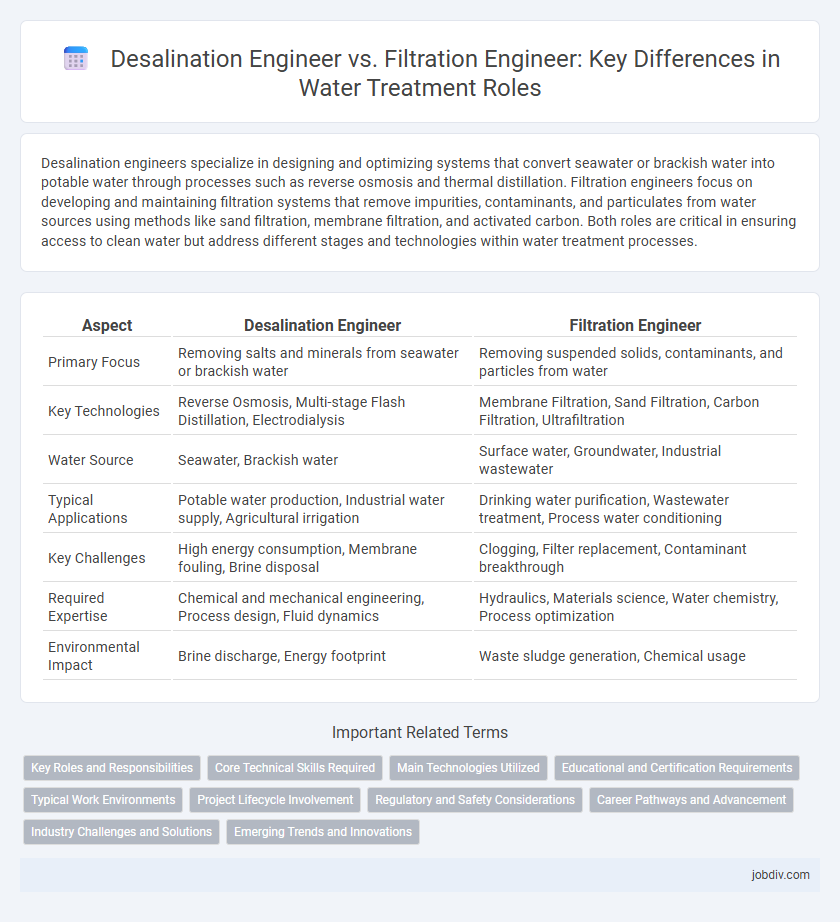Desalination engineers specialize in designing and optimizing systems that convert seawater or brackish water into potable water through processes such as reverse osmosis and thermal distillation. Filtration engineers focus on developing and maintaining filtration systems that remove impurities, contaminants, and particulates from water sources using methods like sand filtration, membrane filtration, and activated carbon. Both roles are critical in ensuring access to clean water but address different stages and technologies within water treatment processes.
Table of Comparison
| Aspect | Desalination Engineer | Filtration Engineer |
|---|---|---|
| Primary Focus | Removing salts and minerals from seawater or brackish water | Removing suspended solids, contaminants, and particles from water |
| Key Technologies | Reverse Osmosis, Multi-stage Flash Distillation, Electrodialysis | Membrane Filtration, Sand Filtration, Carbon Filtration, Ultrafiltration |
| Water Source | Seawater, Brackish water | Surface water, Groundwater, Industrial wastewater |
| Typical Applications | Potable water production, Industrial water supply, Agricultural irrigation | Drinking water purification, Wastewater treatment, Process water conditioning |
| Key Challenges | High energy consumption, Membrane fouling, Brine disposal | Clogging, Filter replacement, Contaminant breakthrough |
| Required Expertise | Chemical and mechanical engineering, Process design, Fluid dynamics | Hydraulics, Materials science, Water chemistry, Process optimization |
| Environmental Impact | Brine discharge, Energy footprint | Waste sludge generation, Chemical usage |
Key Roles and Responsibilities
Desalination engineers specialize in designing, operating, and maintaining systems that remove salt and minerals from seawater or brackish water to produce potable water, focusing on processes like reverse osmosis and thermal distillation. Filtration engineers develop and optimize filtration systems that remove particulates, contaminants, and biological impurities from water sources, emphasizing technologies such as membrane filtration, sand filters, and activated carbon filters. Both roles require expertise in water treatment but differ in their targeted contaminants and the technologies they employ for producing clean water.
Core Technical Skills Required
Desalination engineers require expertise in reverse osmosis, thermal distillation, and membrane technology to convert seawater or brackish water into potable water. Filtration engineers specialize in designing and optimizing mechanical, biological, and chemical filtration systems to remove contaminants from water sources efficiently. Both roles demand strong knowledge of water treatment processes, fluid mechanics, and system automation for ensuring water quality and operational efficiency.
Main Technologies Utilized
Desalination engineers primarily utilize technologies such as reverse osmosis, thermal distillation, and electrodialysis to convert seawater or brackish water into potable water by removing salts and impurities. Filtration engineers focus on microfiltration, ultrafiltration, nanofiltration, and membrane bioreactors to eliminate suspended solids, bacteria, and chemical contaminants from water sources. Both roles incorporate advanced membrane technologies but differ in application, with desalination targeting salt removal and filtration emphasizing contaminant reduction.
Educational and Certification Requirements
Desalination engineers typically require a bachelor's degree in chemical, environmental, or civil engineering, often supplemented by specialized certification in membrane technology or water treatment processes. Filtration engineers usually hold degrees in environmental or mechanical engineering with certifications such as Certified Water Technologist (CWT) or specific filtration system credentials. Both roles benefit from professional licenses like the Professional Engineer (PE) certification, ensuring expertise in water purification and treatment systems.
Typical Work Environments
Desalination engineers primarily operate in coastal facilities and large-scale water treatment plants where seawater or brackish water is converted into potable water using technologies like reverse osmosis and thermal distillation. Filtration engineers typically work in municipal water treatment plants, wastewater treatment facilities, and industrial settings focused on removing contaminants through membrane filtration, sand filters, and activated carbon systems. Both roles demand hands-on involvement with complex water purification equipment and adherence to environmental and safety regulations within specialized water management environments.
Project Lifecycle Involvement
Desalination engineers play a critical role throughout the entire project lifecycle, from feasibility studies and design phases to construction oversight and operational commissioning of desalination plants. Filtration engineers typically engage more intensively during the design and implementation stages, focusing on optimizing filtration systems for water purification and ensuring compliance with water quality standards. Both roles require ongoing collaboration during maintenance and system upgrades to enhance water treatment efficiency and sustainability.
Regulatory and Safety Considerations
Desalination engineers must adhere to strict regulatory standards addressing brine disposal, chemical usage, and marine environmental impact to ensure sustainable operations. Filtration engineers focus on compliance with water quality criteria, chemical handling safety, and filtration membrane integrity to prevent contamination. Both roles require rigorous safety protocols and continual monitoring to meet EPA, WHO, and local water safety regulations.
Career Pathways and Advancement
Desalination engineers specialize in developing technologies for converting seawater or brackish water into potable water, often working with reverse osmosis and thermal distillation systems, while filtration engineers focus on designing and optimizing systems to remove impurities from water sources using methods such as membrane filtration and adsorption. Career advancement for desalination engineers typically involves roles in project management, research and development, or leading large-scale infrastructure projects in coastal regions affected by water scarcity. Filtration engineers advance by gaining expertise in water treatment regulations, advancing to senior engineering roles or consultancy positions in municipal and industrial water purification sectors.
Industry Challenges and Solutions
Desalination engineers tackle challenges like high energy consumption and membrane fouling by developing advanced reverse osmosis technology and energy recovery systems to enhance efficiency and reduce operational costs. Filtration engineers address issues such as clogging, variable water quality, and contaminant removal by designing innovative multi-stage filtration systems and optimizing filter media for durability and improved contaminant capture. Both roles are critical in ensuring sustainable water treatment solutions, balancing technological innovation with environmental and economic considerations.
Emerging Trends and Innovations
Desalination engineers are pioneering advancements in energy-efficient reverse osmosis and emerging forward osmosis technologies to address freshwater scarcity. Filtration engineers innovate with nanomaterials and bio-inspired membrane designs to enhance contaminant removal and sustainability in water treatment. Both specialties drive integration of AI and IoT for real-time monitoring and optimization of water purification processes.
Desalination Engineer vs Filtration Engineer Infographic

 jobdiv.com
jobdiv.com